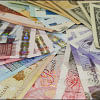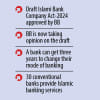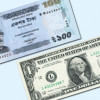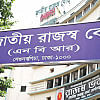Bangladesh Bank raises policy rate: Aims to contain inflation, stabilise forex market

The Bangladesh Bank yesterday raised its key interest rate for the first time in a decade and devalued the local currency for the seventh time this year against the dollar as part of its moves to tackle inflationary forces and restore stability in the foreign exchange market.
The BB interest or policy rate, which is termed the repurchase agreement (repo), is a pivotal benchmark interest rate followed by commercial banks to set the interest rates on both loans and deposits.
Hiking the repo rate means the taka will be costlier, which will subsequently help contain inflation.
Yesterday, the BB raised the repo rate by 25 basis points to 5 per cent, the first hike since January 5, 2012.
The BB notice announcing the hike in the policy rate came hours after it depreciated the exchange rate of the taka by 1.25 per cent to Tk 89 per US dollar. It stood at Tk 85.80 per dollar on December 30 and Tk 84.80 on May 29 last year.
This is the seventh depreciation of the local currency in 2022, which has created inflationary pressure in the market. Inflation shot up to 6.29 per cent in April, the highest in 18 months.
The latest depreciation indicate that inflation might fuel further in the coming days since the factors – from the dragging coronavirus pandemic and the Russian-Ukraine war to supply chain disruptions – that created the exchange rate volatility are still there.
Md Habibur Rahman, chief economist of the BB, said that the hike in the policy rate would help rein in the demand for local and foreign goods.
"We have given a signal to the market that the central bank has started implementing its tools to fight inflation and bring back stability to the foreign exchange market."
Ahsan H Mansur, executive director of the Policy Research Institute of Bangladesh, described the hiking of the policy rate as a good measure but warned that it would be difficult to benefit from the move.
"The central bank should withdraw its lending rate cap in order to make the policy rate hike effective," he said.
The BB declared a lending cap of 9 per cent in April 2020. As a result, banks can't disburse loans beyond the rate, except for credit cards.
"Importers will feel discouraged to import goods if the cost of loans goes up," said Mansur.
A withdrawal of the lending ceiling will impact the deposit rate as it will make the taka more attractive.
"The central bank is cautiously monitoring the lending cap," said Rahman of the BB. "The central bank will do everything in the interest of the economy."
A BB high official, on the condition of anonymity, said that the central bank is currently assessing what the effects would be if the lending cap is scrapped.
The BB will take positive decisions to restore the stability in the financial sector, he said.
"For now, it is a welcoming move, but it is not enough in the context of spiralling inflationary pressure," said Monzur Hossain, research director of the Bangladesh Institute of Development Studies (BIDS).
"The interest rate caps also need to be revised upward to make credits somewhat costly and attract deposits."
He said because of the lending rate cap, many are taking advantage of the cheap loans to import consumer goods.
Hossain was critical of the BB's move to establish a specific exchange rate of the taka against the US dollar.
"The single rate indicates that we have moved away from the floating exchange rate to a fixed rate. What the central bank can do is to fix a band of the exchange rate," he said.
According to Hossain, banks may become selective in import financing following the exchange rate fixation and this may create some distortion in the market and result in inequality in import financing.
"The fixed exchange rate may help contain inflation temporarily. But it is necessary to revise the rates periodically. Otherwise, the taka will become overvalued and this will affect export competitiveness."
The foreign exchange market is under pressure due to the acute greenback shortage amid soaring payments. In addition, the majority of banks are now ignoring the exchange rates set by the central bank.
Although the BB fixed the BC (bills for collection) rate—at which banks sell dollars to importers—at Tk 88, banks are charging importers up to Tk 97.
The central bank yesterday revised upwards the BC selling rate to Tk 89.15 a dollar. Besides, banks have been asked to offer a maximum of Tk 88.15 to exporters while purchasing their export bills.
Mansur said that the central bank should allow the market forces to determine the exchange of the taka.
"It would have been better if the interbank exchange rate was set at Tk 89 per dollar two to three months ago. The state of affairs of the foreign exchange market has changed to a large extent."
"The taka should be depreciated to Tk 92-93 per dollar in order to keep the market stable."

 For all latest news, follow The Daily Star's Google News channel.
For all latest news, follow The Daily Star's Google News channel. 








Comments